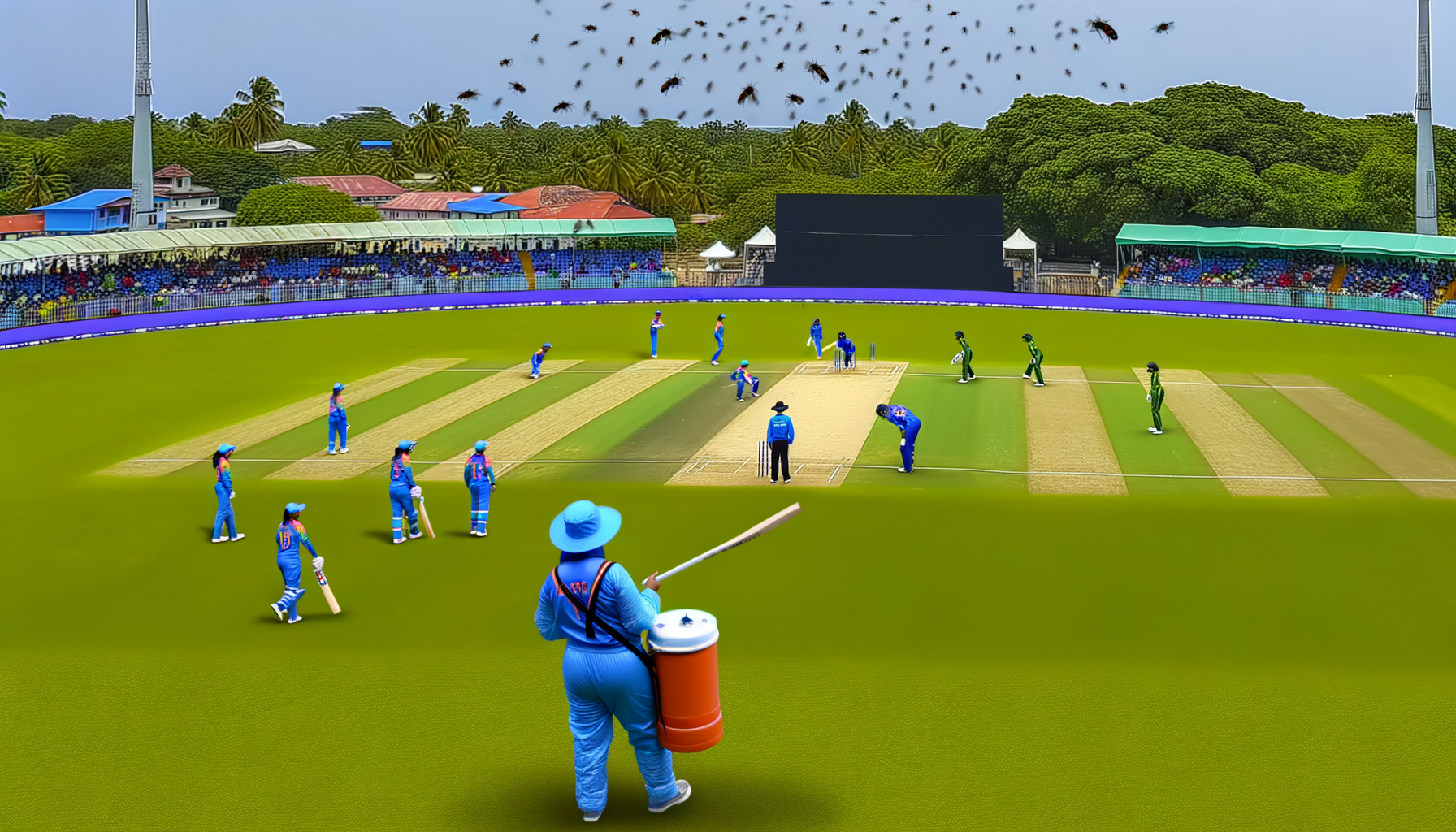India vs Pakistan Women’s World Cup Clash Marred By Controversy And Bugs
Relive the intense India vs Pakistan Women’s World Cup match, full of controversies, flying insects, and no handshakes amid ongoing tensions. Full analysis here.

By Editorial
Introduction To The India vs Pakistan Women’s World Cup Encounter
The 2025 Women’s Cricket World Cup match between India and Pakistan, held in Colombo, was anything but ordinary. From the outset, diplomatic tensions were reflected on the field, with the captains Harmanpreet Kaur and Fatima Sana declining to shake hands before the toss. The game itself was a rollercoaster featuring a swarm of flying insects disrupting play, a controversial run-out decision, and a hard-fought win for India that extended their unbeaten ODI streak against Pakistan to 12 matches.
Match Summary And Key Performances
India batted first and posted a competitive total of 247 all out in their full 50 overs. Notably, no Indian batter reached a half-century, with Harleen Deol leading the charge at 46 runs off 65 balls. Richa Ghosh’s brisk 35 not out off 20 balls and Jemimah Rodrigues’s steady 32 contributed crucially in the middle order. Pakistan’s bowling attack was led by Diana Baig, who took four wickets for 69 runs.
In reply, Pakistan struggled to keep up with the required run rate and were all out for 159 in 43 overs. Sidra Ameen was the standout for Pakistan, scoring a resilient 81 runs off 106 balls, while Natalia Pervaiz added 33. India’s bowlers Kranti Goud and Deepti Sharma were instrumental with three wickets each, supported by Sneh Rana’s two wickets. Despite Pakistan’s fightback, India secured a comfortable 88-run victory.
Flying Insects Disrupt The Game
One of the most unusual elements of this match was the unexpected invasion of flying bugs, which unsettled players and interrupted the flow of the game. Initially, insect repellent was sprayed around the field, but when this proved ineffective, officials resorted to fumigation. A worker wearing a gas mask entered the pitch with a 'Bugbuster' device, causing a 15-minute delay. However, the insects remained persistent throughout, affecting concentration and fielding efforts.
India captain Harmanpreet Kaur was visibly frustrated, once waving away a swarm mid-innings before being dismissed for 19. Jemimah Rodrigues also admitted that the bugs made it difficult to focus, stating, "You had to concentrate a lot more because you couldn't see much with the bugs coming." Such disruptions are rare in international cricket, but they highlighted the unpredictable challenges players can face in subcontinental conditions.
The Controversial Run-Out Of Muneeba Ali
Adding to the drama was the contentious run-out of Pakistan opener Muneeba Ali in the fourth over of Pakistan’s innings. After an lbw appeal, Muneeba left her crease and then hurried back, believing she had grounded her bat safely. However, the bat lifted slightly when the stumps were broken by a throw from Deepti Sharma, and TV umpire Kerrin Klaaste adjudged her out following a review.
This decision caused significant frustration among Pakistan players and fans, as the big screen initially showed 'not out.' The MCC laws specify that a batter is out of her ground unless a part of her bat or body is grounded behind the crease, but allow for loss of contact provided the batter is continuing the motion into the ground. In this instance, the umpire considered Muneeba had not met that criterion.
Further complicating matters, Muneeba could have also been out lbw had India reviewed that dismissal. India’s use of the Decision Review System (DRS) was inconsistent throughout the match, with some wasted reviews and missed opportunities, underscoring the pressure and tactical complexity in high-stakes games.
No Handshakes Amid Political Tensions
The match was played under the shadow of ongoing geopolitical tensions between India and Pakistan. In line with recent men's Asia Cup encounters, the captains did not exchange handshakes either before or after the match. This gesture reflects the complex relationship between the two nations, intensified by earlier incidents such as the militant attack in Indian-administered Kashmir earlier in 2025.
Pakistan’s women have been playing all their World Cup matches in Sri Lanka rather than India due to these tensions, with the two countries expected not to face each other on home soil until at least 2027. The absence of traditional sporting courtesies contrasted sharply with the spirit of cricket, but was deemed necessary by respective cricket boards and governments.
Context From The Men’s Asia Cup Rivalry
The strained atmosphere between the cricketing giants was also evident in the men's 2025 Asia Cup. India’s T20 captain, Suryakumar Yadav, refrained from shaking hands with Pakistan captain Salman Agha throughout their three encounters, including the final in Dubai, which India won. Post-match, India declined to accept the trophy from the Asian Cricket Council chairman Mohsin Naqvi, who also holds high-profile roles in Pakistan’s cricket and government.
Instead, India’s team staged a symbolic lifting of an ‘imaginary’ trophy, highlighting the political undertones overshadowing sport. This has raised questions about the future of cricket diplomacy and whether sporting events can help ease or exacerbate bilateral tensions.
Looking Ahead: Upcoming Fixtures And Coverage
Pakistan faces title favourites Australia next in Colombo, while India will host South Africa in Vizag. Both fixtures promise to be crucial for the teams’ campaigns and are scheduled for 10:30 am UK time, with build-up coverage starting at 10 am on Sky Sports Cricket.
Fans can stream the Women’s Cricket World Cup live and contract-free via NOW, ensuring accessibility for cricket enthusiasts across the UK and Ireland. For those interested in broader cricket developments, our comprehensive updates on The Hundred cricket competition provide further insights into the sport’s evolving landscape.
Conclusion: A Match Reflecting More Than Just Cricket
The India vs Pakistan Women’s World Cup match was a microcosm of the broader complexities surrounding sport, politics, and the environment. While India extended their dominance in ODIs against Pakistan, the game’s unique challenges — from swarming insects to contentious umpiring decisions and the absence of traditional sportsmanship gestures — underscored the multifaceted pressures players face.
As the tournament progresses, both teams will look to focus on their cricketing performance while navigating the intricate context off the field. This match will be remembered not only for its statistical outcomes but also for highlighting the resilience and adaptability of women cricketers under unusual and intense circumstances.
For those keen to explore more cricket stories and updates, including domestic leagues and England team news, visit our comprehensive guide to England cricket teams and domestic leagues.
Related topics
Editorial
Sports expert at SportsScoop
Specialist in sports analysis and journalism
Related articles
Want to read more?
Explore our comprehensive collection of sports articles and analysis, or contact us for more information.



